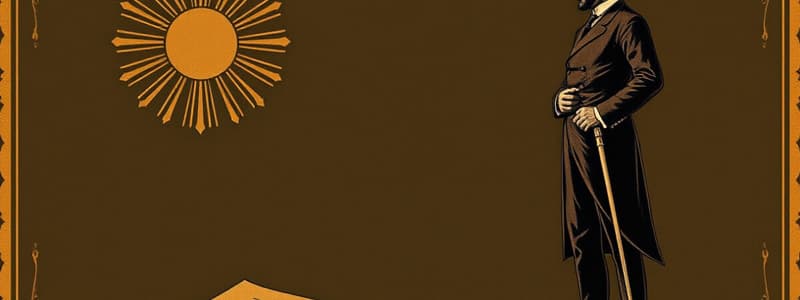Podcast
Questions and Answers
What was the primary aim of the bill sponsored by Laurel in 1956?
What was the primary aim of the bill sponsored by Laurel in 1956?
- To encourage the reading of foreign literature
- To enhance nationalism through the works of Jose Rizal (correct)
- To limit the influence of the Catholic Church in education
- To promote the Spanish language in schools
Which senators were identified as opposing the bill primarily due to their Catholic beliefs?
Which senators were identified as opposing the bill primarily due to their Catholic beliefs?
- Jose P. Laurel, Decoroso Rosales, and Fr. Jesus Cavanna
- Mariano Cuenco, Francisco Rodrigo, and Decoroso Rosales (correct)
- Sen. Recto, Mariano Cuenco, and Decoroso Rosales
- Jose P. Laurel, Francisco Rodrigo, and Mariano Cuenco
What action did the Catholic Church NOT take in opposition to the bill?
What action did the Catholic Church NOT take in opposition to the bill?
- Encouraging voters to write to their representatives
- Organizing symposiums for support
- Publishing a pastoral letter
- Funding a documentary on Rizal's novels (correct)
What was one of the Church's arguments against the mandatory reading of Rizal's works?
What was one of the Church's arguments against the mandatory reading of Rizal's works?
What was Fr. Jesus Cavanna's position regarding the teaching of Rizal's novels?
What was Fr. Jesus Cavanna's position regarding the teaching of Rizal's novels?
What was the main purpose of Republic Act 1425?
What was the main purpose of Republic Act 1425?
Which senator is noted for promoting the Rizal Bill?
Which senator is noted for promoting the Rizal Bill?
What historical context led to the formulation of the Rizal Law?
What historical context led to the formulation of the Rizal Law?
What is one of the objectives of the lesson on the Rizal Law?
What is one of the objectives of the lesson on the Rizal Law?
What significant works of Jose Rizal does the Rizal Law make compulsory reading?
What significant works of Jose Rizal does the Rizal Law make compulsory reading?
Flashcards are hidden until you start studying
Study Notes
Introduction to Republic Act 1425 (The Rizal Law)
- Republic Act 1425, known as the Rizal Law, was enacted on June 12, 1956.
- This legislation aims to celebrate the heroism of Dr. Jose Rizal as a national symbol and foster Filipino nationalism, especially among the youth.
Objectives of the Lesson
- Discuss the democratic process leading to the Rizal Law's enactment.
- Explore the history and important provisions of the Rizal Law.
- Analyze the relevance of studying Jose Rizal in the 21st century.
Context and Development of the Rizal Bill
- Post-World War II, the Philippines faced numerous challenges necessitating national recovery.
- Leaders like Senator Claro M. Recto advocated for nationalism and patriotism, emphasizing the need to educate the youth.
- The Rizal Bill (Senate Bill No. 438) was introduced on April 3, 1956, to require the reading of Rizal's novels, "Noli Me Tangere" and "El Filibusterismo," in all educational institutions.
Key Proponents and Debates
- Senator Jose P. Laurel sponsored the bill, asserting that Rizal’s works reflect Filipino identity and values.
- Key statement from Laurel: Rizal’s novels serve as mirrors reflecting strengths and weaknesses, fostering national consciousness.
- Debates over the bill began on April 23, 1956, facing significant opposition primarily from the Catholic Church, which criticized the bill as anti-Catholic.
Opposition to the Rizal Bill
- Opposition from Catholic senators included Mariano J. Cuenco, Francisco Rodrigo, and Decoroso Rosales, who argued against the bill’s implications on religious freedom.
- The Catholic Church launched vigorous campaigns, urging followers to lobby against the bill.
- Concerns were raised that requiring the reading of Rizal’s novels would misrepresent current socio-political conditions in the Philippines.
Church's Actions Against the Bill
- The Church organized symposiums and published critical pastoral letters, notably by Archbishop Rufino Santos, to rally opposition.
- Arguments included that the novels contained content offensive to Catholic doctrine and could potentially divide the nation.
Arguments Against the Bill
- Critics claimed the bill sought to undermine the Catholic faith.
- Specific lines in Rizal’s novels were highlighted as offensive, raising concerns about mandating their reading.
- Opponents viewed the compulsory reading as controversial and detrimental to societal cohesion.
Conclusion
- The implementation of the Rizal Law emphasizes the importance of Jose Rizal's works in cultivating nationalism and identity among Filipinos, particularly the youth, amid historical and contemporary challenges.
Studying That Suits You
Use AI to generate personalized quizzes and flashcards to suit your learning preferences.




